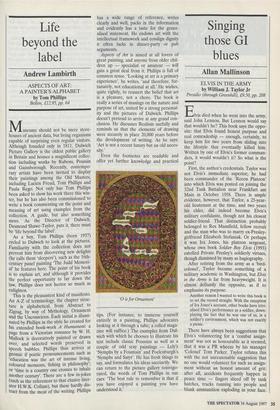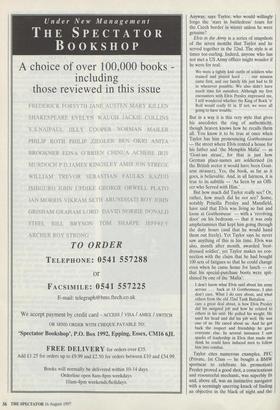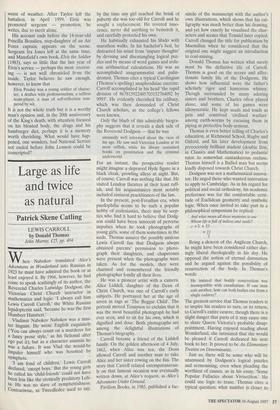Singing those GI blues
Allan Mallinson
ELVIS IN THE ARMY by William J. Taylor Jr
Presidio (through Greenhill), £9.50, pp. 208 Elvis died when he went into the army, said John Lennon. But Lennon would say that wouldn't he? This book says the oppo- site: that Elvis found honest purpose and real comradeship — enough, certainly, to keep him for two years from sliding into the lifestyle that eventually killed him. Written by one of Elvis's former comman- ders, it would wouldn't it? So what is the point?
First, the author's credentials. Taylor was not Elvis's immediate superior; he had been commander of the `Recon Platoon' into which Elvis was posted on joining the 32nd Tank Battalion near Frankfurt am Main in October 1958. There is ample evidence, however, that Taylor, a 25-year- old lieutenant at the time, and two years his elder, did indeed become Elvis's military confidante, though not his closest soldier-friend. That distinction probably belonged to Rex Mansfield, fellow recruit and the man who was to marry ex-Presley- girlfriend Elizabeth Stefaniak. Or perhaps it was Ira Jones, his platoon sergeant, whose own book Soldier Boy Elvis (1993) extolled Private Presley's soldierly virtues, though dismissed by many as hagiography. After retiring from the army as a 'bird- colonel', Taylor became something of a military academic in Washington, but Elvis in the Army is far from heavyweight. It is almost defiantly the opposite, as if to emphasise its purpose:
Another reason I wanted to write this book is to set the record straight. With the exception of Ira Jones's account, other books have trivi- alised Elvis's performance as a soldier, down- playing the fact that he was one of us, in a soldier's environment, which was not exactly a picnic.
There have always been suggestions that Elvis's volunteering for a 'combat assign- ment' was not as honourable as it seemed, that it was a PR wheeze by his manager `Colonel' Tom Parker. Taylor refutes this with the not unreasonable suggestion that no one would volunteer, for such an assign- ment without an honest amount of grit: after all, accidents frequently happen in peace time — fingers sliced off by tank hatches, trucks running into people and blank ammunition exploding in your face. Anyway, says Taylor, who would willingly forgo the 'stars in battledress' tours for the Czech border in winter unless he were genuine?
Elvis in the Army is a series of snapshots of the seven months that Taylor and he served together in the 32nd. The style is at times toe-curling. Indeed, anyone who has not met a US Army officer might wonder if he were for real:
We were a tightly knit outfit of soldiers who trained and played hard . . . our mission came first, and our family life just had to fit in whenever possible. We also didn't have much time for outsiders. Although my first encounters with Elvis Presley impressed me, I still wondered whether the King of Rock 'n' Roll would really fit in. If not, we were all going to have trouble.
But in a way it is this very style that gives his anecdotes the ring of authenticity, though heaven knows how he recalls them all. You know it to be true at once when Taylor has him pronouncing Goethestrasse — the street where Elvis rented a house for his father and 'the Memphis Mafia' — as `Goat-ass strass', for that is just how German place-names are soldierised (in the British sector it would have been Goat- arse strasser). Yes, the book, as far as it goes, is believable. And, in all fairness, it is true to its subtitle — 'As Seen by an Offi- cer who Served with Him.'
But how much did Taylor really see? Or, rather, how much did he not see? Some, notably Priscilla Presley and Mansfield, have said that Elvis was living so fast and loose at Goethestrasse — with a 'revolving door' on his bedroom — that it was only amphetamines that kept him going through the duty hours (and that he would hand them out freely). Yet Taylor says he never saw anything of this in his time. Elvis was also, month after month, awarded 'best- dressed soldier', yet Taylor makes no con- nection with the claim that he had bought 100 sets of fatigues so that he could change even when he came home for lunch — or that his special-purchase boots were spit- shined by one of the 'Mafia':
I don't know what Elvis said about his army service ... back at 14 Goethestrasse. I also don't care. What I do care about, and what others from the old 32nd Tank Battalion ... care a great deal about, is how Elvis Presley did his assigned job and how he related to others in his unit. He pulled his weight. He used his head and did his job well. He was one of us. He cared about us. And he got back the respect and friendship he gave everyone else. In several instances I saw sparks of leadership in Elvis that made me think he could have induced men to follow him into combat.
Taylor cites numerous examples. PFC (Private, 1st Class — he bought a BMW sportscar to celebrate his promotion) Presley proved a good shot, a conscientious and resourceful mechanic, was superbly fit and, above all, was an instinctive navigator with a seemingly unerring knack of finding an objective in the black of night and the worst of weather. After Taylor left the battalion, in April 1959, Elvis was promoted sergeant — promotion, he writes, due to merit alone.
His account ends before the 14-year-old Priscilla Beaulieu, step-daughter of an Air Force captain, appears on the scene. Sergeant Ira Jones left at the same time, and Mansfield's own book, Elvis the Soldier (1983), says so little that the last year of Elvis's service — perhaps the most interest- ing — is not well chronicled from the inside. Taylor believes he saw enough, however, to know that
Elvis Presley was a young soldier of charac- ter, a draftee with professionalism, a selfless team-player, a man of self-reflection tem- pered by wit.
It is not the whole truth but it is a worthy man's opinion and, in the 20th anniversary of the King's death, with attention focused on his bloated body, the drugs and his hamburger diet, perhaps it is a memory worth cherishing. What would have hap- pened, one wonders, had National Service not ended before John Lennon could be conscripted?




























































 Previous page
Previous page